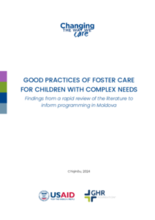International child rights instruments underscore the significance of children being raised within a family environment. Recognizing that children with disabilities have all the same rights as children who do not have disabilities, the right to family-based alternative care also applies to them. Evidence also regularly demonstrates that disability is a primary reason that children are placed in institutional care globally. This is also true in Moldova.
Moldova has made remarkable progress in reducing the dependence on institutional care, significantly reducing the number of children in institutions from a peak of 17,000 in 2003 to less than 600 in 2024. Of the children remaining in institutional care in Moldova, approximately 19% have a disability.
To end reliance on residential care and ensure all children can grow up in a safe and nurturing family setting, Moldova has made a commitment to reaching zero children in residential care in the coming years. Moldova’s Ministry of Labor and Social Protection, with the technical expertise of Changing the Way We Care, has designed and is implementing a pilot model of specialized foster care for children with complex needs.
Good Practices of Foster Care for Children with Complex Needs: Findings from a rapid review of the literature to inform programming in Moldova summarizes international best practices of specialized foster care and provides critical insights and recommendations for developing and scaling specialized foster care in Moldova.

